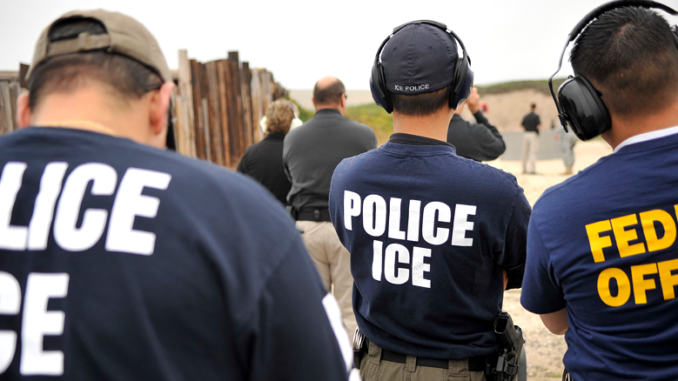
“Federal prosecutors have issued sweeping subpoenas demanding that millions of North Carolina voter records be turned over to immigration authorities by Sept. 25,” the New York Times reported on Wednesday, two months before November’s federal midterm election.
On Friday the Department of Justice’s North Carolina U.S. Attorney’s Office in Eastern District of North Carolina (EDNC) sent the unsealed grand jury subpoenas to North Carolina’s state board of elections and to 44 county elections boards in eastern North Carolina requesting records dating back to the start of 2010.
The subpoenas were not widely known about until voting rights lawyer Marc E. Elias, who is aligned with the Democrat party, tweeted it out on his social media account on Tuesday.
“A meeting notice from the board says the subpoena came at the request of Immigration and Customs Enforcement,” the News Observer, out of Raleigh, NC, reported, and that the subpoenas, received by fax, required that “state and counties must appear in court with the documents in Wilmington on Sept. 25 at 8 a.m.”
According to North Carolina’s State Board of Elections and Ethics Enforcement, North Carolina has 7 million registered voters and has stored over 15 million documents on its voter’s registration database.
Robert J. Higdon, Jr., was appointed U.S. Attorney General for the Eastern District of North Carolina by President Trump last October. The subpoenas are seen as a move related to a new task force Hidgon created within that DOJ’s office that was announced last month August 17 via the EDNC website saying, “Fraudsters in Eastern, North Carolina Beware! U.S. Immigration and Customs Enforcement, Homeland Security Investigations (HSI) has Identified Raleigh as an Expansion Site to Create a New Document and Benefit Fraud Task Force,” saying they were now “partnered” with Homeland Security “and other top-tier law enforcement agencies.”
The Immigration and Customs Enforcement agency is a department division under direction of Homeland Security.
The task force is being led by the Homeland Security Department’s Immigration and Customs Enforcement division and the State Department’s Diplomatic Security Service and will “pursue benefit fraud investigations and prosecutions” and will be a part of what is known as the DBFTFs (Document and Benefit Fraud Task Force) which operates under the ‘authority’ of ICE and now brings the number to 29 states such task force are partnered with HLS and other federally operated law enforcement agencies operating within states.
“Representatives of ICE and the Justice Department officials involved declined to comment on the matter,” the NYT’s said, and that the DOJ in Washington referred questions to Higdon’s office, but that Higdon’s office declined to comment as well.
However, on Wednesday Bryan D. Cox, an ICE spokesman, said, “the investigation in North Carolina was “locally driven”” by Higdon’s EDNC department.
The NYT’s further reported, “When the Trump administration’s voter fraud commission imploded in January, the commission’s vice chairman – Kris Kobach, the Kansas secretary of state – said its work would be transferred to the Homeland Security Department.
(You can read TMB’s latest update on Kris Kobach here.)
The subpoenas are coming after it was reported last week the EDNC charged 19-foreign nationals, nine of which were legal permanent residents, alleging they illegally voted in North Carolina in the 2016 election.
The North Carolina legislature is seeking voter approval for an amendment to their constitution “that would require all voters to produce approved IDs before casting ballots” in the upcoming November elections.
A previous attempt by the North Carolina legislature to pass a voter ID law was struck down by a unanimous decision by the Federal Court of Appeals Fourth Circuit in 2016, Politico reported, “holding that it was ‘passed with racially discriminatory intent’.” A NYT’s report said the federal appeals court’s 83-page decision said that the law “deliberately “target African-American voters with almost surgical precision” in an effort to depress black turnout at the polls.”
University of Florida’s Michael McDonald, a professor of political science, said of the case of the 19-foreign nationals charged under Higdon’s new task force, “there’s a lot of discretion that prosecutors have in pursuing people. If they’re going after people of this caliber, they’re really scraping the bottom of the barrel to really try and find as many instances of noncitizen voting as they can,” adding that it was common in these cases to see prosecutors announce large numbers of indictments to grab headlines, but that as the real litigation plays out those numbers significantly drop.
“I’m always suspicious about motives when we see allegations come out without due process being applied for these individuals.”
Among the state records ICE are subpoenaing date back from as far as Jan. 1, 2010 and run through to Aug. 30, 2018, the News Observer said, included: all voter registration applications, federal write-in absentee ballots, federal post card applications, early-voting applications forms, provisional voting forms, absentee ballot request forms, all ‘admission or denial of non-citizen return form,’ and all voter registration cancellations or revocation forms.”
North Carolina’s state board of elections has called a meeting for this Friday to meet with the 44 county election boards and will determine then how they will proceed.
Josh Lawson, general counsel for the state board said, “We are deeply concerned by the administrative drain on county boards of elections in order to comply with the extensive subpoenas immediately prior to a federal election, including the necessary reproduction of millions of documents (all ballots, etc.),” adding that “compliance with the subpoena as-written will materially affect the ability of county administrators to perform time-critical tasks ahead of absentee voting and early voting.”
“Of particular concern was the subpoena’s request for actual ballots that had been cast in prior elections. In North Carolina, votes cast on Election Day are anonymous and untraceable, but absentee ballots and those cast in early voting — a sizable share of the total — are marked with numbers that can be traced to the people who cast them.”

1 Trackback / Pingback
Comments are closed.